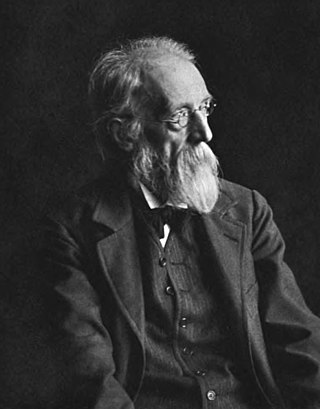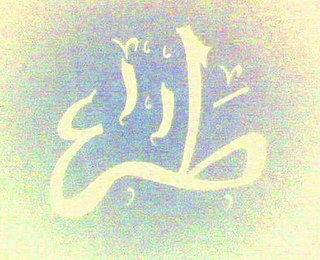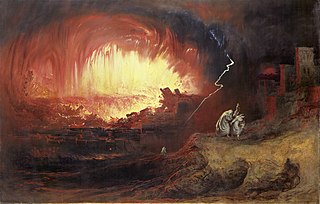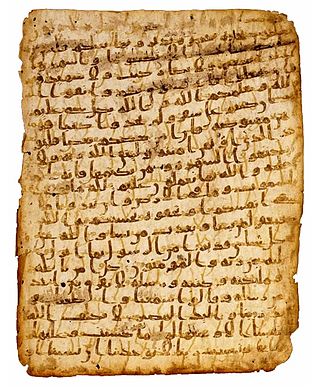Related Research Articles

The Quran, also romanized Qur'an or Koran, is the central religious text of Islam, believed by Muslims to be a revelation from God. It is organized in 114 chapters, which consist of verses. In addition to its religious significance, it is widely regarded as the finest work in Arabic literature, and has significantly influenced the Arabic language.

Theodor Nöldeke was a German orientalist and scholar. His research interests ranged over Old Testament studies, Semitic languages and Arabic, Persian and Syriac literature. Nöldeke translated several important works of oriental literature and during his lifetime was considered an important orientalist. He wrote numerous studies and contributed articles to the Encyclopædia Britannica. He is credited with starting the higher criticism of the Qur’ān.
A surah is the equivalent of "chapter" in the Qur'an.
The Madni Surahs (Surah Madaniyah) or Madani chapters of the Quran are the latest 26 Surahs which, according to Islamic tradition, were revealed at Medina after Muhammad's hijrah from Mecca. The community was larger and more developed, in contrast to its minority position in Mecca.
The Meccan surat are, according to the timing and contextual background of their revelation within Islamic tradition, the chronologically earlier chapters of the Qur'an. The traditional chronological order attributed to Ibn Abbas became widely accepted following its adoption by the 1924 Egyptian standard edition. The Meccan chapters are believed to have been revealed anytime before the migration of the Islamic prophet Muhammad and his followers from Mecca to Medina (Hijra). The Medinan surahs are those revelations which occurred after the move.

Ṭā Hā is the 20th chapter (sūrah) of the Qur'an with 135 verses (āyāt). It is named "Ṭā Hā" because the chapter starts with the Arabic ḥurūf muqaṭṭaʿāt: طه (Ṭāhā) which is considered to be one of the names of the Islamic prophet Muhammad.

Sad is the 38th chapter (sūrah) of the Qur'an with 88 verses (āyāt) and 1 sajdah ۩ (38:24). Sad (ص) is the name of the eighteenth letter in the Arabic alphabet.

Adh-Dhariyat is the 51st chapter (surah) of the Qur'an with 60 verses (ayat). It mentions Abraham, Noah, and the day of judgment, and reiterates the essential Quranic message.
Al-Muzzammil is the seventy-third chapter (sūrah) of the Qur'an, containing 20 verses (āyāt), which are recognized by Muslims as the word of God (Allah). The last Ruku of this surah contains only one ayāt making it possibly the smallest Ruku according to the number of verses or ayāt.
Collyridianism was an alleged Early Christian movement in Arabia whose adherents apparently worshipped the Virgin Mary, mother of Jesus, as a goddess. The existence of the sect is subject to some dispute by scholars, as the only contemporary source to describe it is the Panarion of Epiphanius of Salamis, published in approximately 376 AD.

In Islam, ’i‘jāz or inimitability of the Qur’ān is the doctrine which holds that the Qur’ān has a miraculous quality, both in content and in form, that no human speech can match. According to this doctrine the Qur'an is a miracle and its inimitability is the proof granted to Muhammad in authentication of his prophetic status. It serves the dual purpose of proving the authenticity of its divineness as being a source from the creator as well as proving the genuineness of Muhammad's prophethood to whom it was revealed as he was the one bringing the message.
The history of the Quran, the holy book of Islam, is the timeline and origin of the written compilations or manuscripts of the Quran, based on historical findings. It spans several centuries, and forms an important major part of the early history of Islam.

The Syro-Aramaic Reading of the Koran: A Contribution to the Decoding of the Language of the Koran is an English-language edition (2007) of Die syro-aramäische Lesart des Koran: Ein Beitrag zur Entschlüsselung der Koransprache (2000) by Christoph Luxenberg.

The Sanaa palimpsest or Sanaa Quran is one of the oldest Quranic manuscripts in existence. Part of a sizable cache of Quranic and non-Quranic fragments discovered in Yemen during a 1972 restoration of the Great Mosque of Sanaa, the manuscript was identified as a palimpsest Quran in 1981 as it is written on parchment and comprises two layers of text. The upper text largely conforms to the standard 'Uthmanic' Quran in text and in the standard order of chapters, whereas the lower text contains many variations from the standard text, and the sequence of its chapters corresponds to no known Quranic order. A partial reconstruction of the lower text was published in 2012, and a reconstruction of the legible portions of both lower and upper texts of the 38 folios in the Sana'a House of Manuscripts was published in 2017 utilising post-processed digital images of the lower text. A radiocarbon analysis has dated the parchment of one of the detached leaves sold at auction, and hence its lower text, to between 578 CE and 669 CE with a 95% accuracy. The earliest leaves have been tested at three laboratories and dated to 388-535 CE. Other folios have similar early dates.

Corpus Coranicum is a digital research project of the Berlin-Brandenburg Academy of Sciences and Humanities.

The Sigmund Freud Prize or Sigmund Freud Prize for Academic Prose is a German literary award named after Sigmund Freud and awarded by the Deutsche Akademie für Sprache und Dichtung. It was first awarded in 1964.

Klaus Heinrich was a German philosopher of religion.

In Muslim tradition the Quran is the final revelation from God, Islam's divine text, delivered to the Islamic prophet Muhammad through the angel Jibril (Gabriel). Muhammad's revelations were said to have been recorded orally and in writing, through Muhammad and his followers up until his death in 632 CE. These revelations were then compiled by first caliph Abu Bakr and codified during the reign of the third caliph Uthman so that the standard codex edition of the Quran or Muṣḥaf was completed around 650 CE, according to Muslim scholars. This has been critiqued by some western scholarship, suggesting the Quran was canonized at a later date, based on the dating of classical Islamic narratives, i.e. hadiths, which were written 150–200 years after the death of Muhammad, and partly because of the textual variations present in the Sana'a manuscript. With the discovery of earlier manuscripts which conform to the Uthmanic standard however, the vast majority of Western revisionist theories regarding the historical origins of the Quran have fallen out of favor and been described as "untenable".
Gabriel Said Reynolds is an American academic and historian of religion, who serves as Jerome J. Crowley and Rosaleen G. Crowley Professor of Theology and assistant professor of Islamic Studies and Theology at the University of Notre Dame. His scholarship focuses on World Religions and World Church, History of Christianity, Qur'anic Studies, Origins of Islam, and Muslim-Christian relations.
Karl Albert Kurt von Fritz was a German classical philologist.
References
- ↑ "Angelika Neuwirth". Munzinger Biographie (in German). Retrieved 1 December 2020.
- ↑ academia.net.org profile
- 1 2 "Arabic Studies Professor Angelika Neuwirth Awarded Honorary Doctorate from Yale". Freie Universität Berlin. 1 December 2020. Retrieved 1 December 2020.
- ↑ Qantara website, article by Stefan Weidner 6 May 2011
- ↑ American Academy of Arts and Sciences press release 4/19/2011
- ↑ YaleNews May 21, 2012
- ↑ "Awards – Sigmund-Freud-Preis – Angelika Neuwirth". Deutsche Akademie für Sprache und Dichtung (in German). Retrieved 1 December 2020.
- ↑ Freie Universität press release July 31, 2013
- ↑ "Record number of academics elected to British Academy". British Academy. 20 July 2018. Retrieved 28 July 2020.